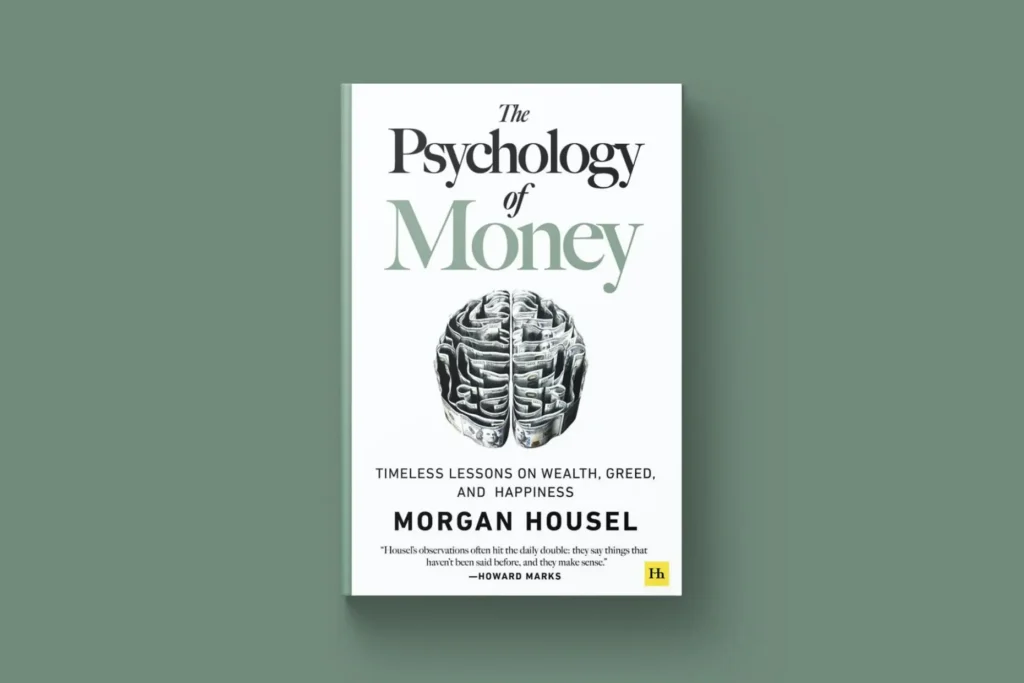The Psychology of Money by Morgan Housel offers a thought-provoking exploration of how we think about, make decisions with, and relate to money. The book emphasizes that financial success isn’t just about knowledge, but also about behavior. It dives deep into the human emotions and biases that drive our financial choices, showing how personal experiences, perspectives, and feelings influence our relationship with money in profound ways.

The Key Themes in The Psychology of Money
Wealth is What You Don’t See
One of the core ideas of the book is that real wealth is often invisible. People tend to equate wealth with visible displays of luxury—expensive cars, big houses, or extravagant vacations. However, true wealth is typically accumulated quietly over time and is not always seen in external appearances.
Lesson: Building wealth doesn’t require flaunting it. In fact, often the richest people are those who live below their means and keep their wealth hidden.
Luck and Risk
Housel emphasizes that financial success is influenced not only by smart decisions and hard work but also by luck. He explains that while some people experience extraordinary good fortune, others face risk and misfortune, often through no fault of their own.
Lesson: Be aware of the role luck and risk play in financial outcomes. While it’s essential to make good decisions, not everything is within your control.
The Role of Time in Wealth Building
Housel explains how time is one of the most important factors in accumulating wealth. The magic of compounding works over the long run, and many of the best investors became wealthy not because of extraordinary skill, but because they invested and let time do its work.
Lesson: Building wealth takes time and patience. Let your investments grow over time, and understand that compounding can have an exponential effect on your financial future.
The Importance of Saving
Housel discusses how saving, rather than earning or spending, is the cornerstone of financial security. Saving consistently—no matter how small the amount—is key to building wealth and providing yourself with financial freedom.
Lesson: It’s not about how much you earn, but how much you save. Create a habit of saving and live below your means.
The Behavior of Money
Financial decisions are deeply emotional. Whether it’s the fear of losing money, the desire to show off wealth, or the greed for more, emotions often drive poor financial choices. Understanding these emotions can help you avoid common mistakes and make better decisions.
Lesson: Being aware of your emotions around money and making decisions based on long-term goals, rather than short-term impulses, is crucial for financial success.
Psychological Traps That Impact Our Financial Decisions
The Herd Mentality
People often follow the crowd, especially when it comes to investing. This tendency can lead to poor decision-making, such as buying into a booming market out of fear of missing out (FOMO).
Lesson: It’s essential to think independently and avoid following the crowd when it comes to making financial decisions.
Overconfidence Bias
Many people overestimate their financial knowledge and abilities. This can lead to risky investments or poor financial decisions.
Lesson: Be humble with your financial knowledge. Understand that no one has perfect foresight, and mistakes are inevitable. Always make decisions with caution and humility.
Present Bias
Humans have a natural tendency to favor immediate gratification over future rewards, which can lead to poor financial habits like overspending or failing to save adequately for retirement.
Lesson: Developing long-term thinking and being disciplined about saving and investing today will pay off later in life.
The Intersection of Money and Happiness
Housel also explores the complex relationship between money and happiness. He acknowledges that while money can improve quality of life by reducing stress and providing comfort, it’s not the only key to happiness. In fact, beyond a certain point, more money doesn’t necessarily lead to greater happiness.
Lesson: While money is important, it’s essential to recognize that happiness comes from factors like relationships, health, and fulfillment, not just material wealth.
How to Build a Healthy Relationship with Money
Focus on What You Can Control
Focus on behaviors and actions that can directly improve your financial situation, like saving, investing, and spending wisely. Don’t get caught up in things you can’t control, like the economy or market fluctuations.
Action Step: Identify the financial behaviors you can control and make them consistent parts of your routine.
Avoid Comparing Yourself to Others
Constantly comparing your financial situation to others can lead to feelings of inadequacy or greed. Focus on your own goals and progress.
Action Step: Develop your own definition of financial success and work toward it, rather than measuring yourself against others.
Accept the Role of Luck
Recognize that not all financial outcomes are the result of your effort or intelligence. Luck plays a role, and acknowledging this can help you remain humble and avoid regret.
Action Step: Don’t be discouraged by setbacks, and don’t be arrogant about successes. Stay focused on making wise, long-term financial decisions.
Learn to Be Content
The book emphasizes that contentment is essential for financial peace. While it’s important to strive for financial success, learning to appreciate what you have in the moment is crucial.
Action Step: Practice gratitude and focus on enjoying the present moment, rather than constantly striving for more.
Who Should Read This Book?
Anyone Interested in Personal Finance: Whether you’re just starting to manage your finances or you’re an experienced investor, this book provides valuable insights into the psychology behind financial decisions.
Aspiring Investors: Understanding the human behaviors that influence money management is crucial for successful investing.
People Seeking Financial Freedom: If you want to build wealth and create financial security, The Psychology of Money offers practical lessons on how to make smarter decisions.
Final Thoughts
The Psychology of Money offers timeless lessons on how to approach wealth, happiness, and financial decision-making. By recognizing the psychological biases that influence our choices, we can build better financial habits and gain a healthier relationship with money. The book reinforces the idea that wealth-building isn’t just about knowledge—it’s about behavior, patience, and long-term thinking.
“Doing well with money has little to do with how smart you are and a lot to do with how you behave.” – Morgan Housel
If you’re ready to rethink your relationship with money and make more mindful, intentional decisions, The Psychology of Money is the perfect starting point for mastering both your finances and your mindset.










